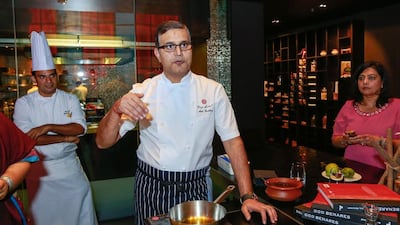Atul Kochhar's laid-back demeanour makes it easy to forget that he is regarded as one of the best chefs in the UK. He has presented a television show, 2010's Atul's Spice Kitchen: Malaysia, and is a regular face on celebrated cookery programmes in the UK, including Market Kitchen and Saturday Kitchen.
Importantly, he was the first Indian chef whose restaurant was awarded a Michelin star. He has six restaurants around the world, including Rang Mahal by Atul Kochhar at the JW Marriott Marquis in Dubai and will open his seventh next month, in Mumbai, India.
Kochhar’s speciality is modern Indian cuisine that stays true to the authentic flavours of his homeland, while also following the latest food trends.
“My food is easy,” says the 46-year-old. “My food is natural. People enjoy what I do. It’s contemporary Indian. Whatever trends there are, whatever ingredients there are on the market, if there’s any new technology out there, I use it.”
Kochhar is a highly trained chef with strong culinary instincts. He was born in the northern Indian state of Bihar into a family who knew their way around the kitchen: his father was a caterer, his mum an excellent home cook and his grandfather was a baker.
“I was always surrounded by food,” says Kochhar. “I was constantly going to the markets with my father, helping to carry his sacks, helping him in his business, making samosas from time to time.”
But Kochhar’s father wanted a different life for his son and urged him to become an engineer or a doctor.
“Every [Indian] parent says that to their kids,” Kochhar says. “They want their children to do better than them. All of us [his generation] would have taken engineering or medical entrance exams. I did, too.”
Though Kochhar did win a place to study engineering at university, he did not pursue it. Instead, he followed his heart and went to culinary school.
After learning the principles of cooking and honing his skills, Kochhar trained under eminent German chef Bernard Koenig, a great lover of Indian food, and Kochhar would often prepare Indian meals for his mentor.
Koenig recognised his young apprentice’s talent and encouraged him to pursue a culinary career outside of India.
“He told me: ‘You’re 20 years ahead of your time. I don’t think India is ready for your food. There will be a time when you can come back to India,’” says Kochhar.
He took the advice and went to London in 1994 to work in Tamarind, which was a new Indian restaurant. His plan was to work in London for a few years before moving on to other well-known restaurants around the world. Then, during his reign as Tamarind’s head chef, Kochhar earned the restaurant a Michelin star.
“That changed everything for me,” he says. “I had to stay.”
Kochhar's next step was to open his own restaurant, and in 2003 he launched Benares in London. It was awarded a Michelin star in 2007 and its inclusion in the recently announced 2016 Michelin Guide Great Britain and Ireland means it has held that star for a decade.
With pride, but nary a hint of arrogance, Kochhar says: “With our star this year, Benares has become the only Indian restaurant in the UK, perhaps in the world, to maintain the star for 10 years.”
Not that he is resting on his laurels – Kochhar shows no signs of slowing down. He has just launched a development kitchen in London where he and a team of four chefs will develop new dishes for his evolving portfolio of restaurants. He is also busy getting ready for the launch of his new restaurant in Mumbai on January 7. In a surprising twist, it will not serve authentic Indian food.
“I’ve cooked Indian food outside India for 23 years now,” he says. “I didn’t want to go back to India and cook Indian food.”
Instead, the restaurant will focus on dishes that reflect what happens to Indian food outside of India. When people migrate and settle elsewhere, the dishes change because authentic ingredients are difficult – sometimes impossible – to find.
“People use the ingredients that are available to them and the dishes change – that’s the story behind the restaurant,” says Kochhar.
His sense of humour is evident as he reveals its name.
“The Indians who have migrated out of India are called NRIs – non-resident Indians,” he says. “So I called my restaurant NRI.” Then, with a laugh, he adds: “But in brackets, it says ‘not really Indian’.”
It’s this light-hearted approach that has helped pave the way for his success.
“I take life the way it comes,” says Kochhar. “I don’t fuss about small things. It’s not worth it. If there’s a success, it’s the team’s success. I love sharing. I love what I have with my friends and my family.”
sjohnson@thenational.ae

